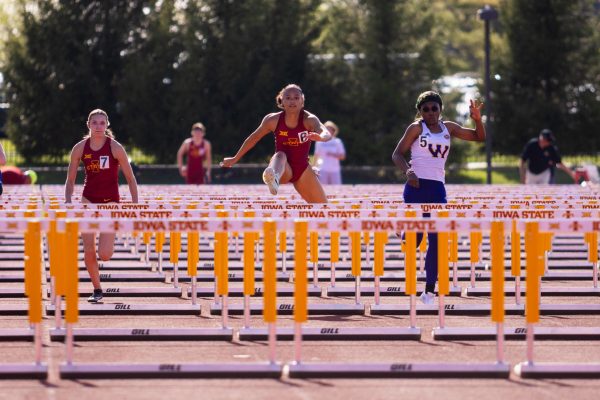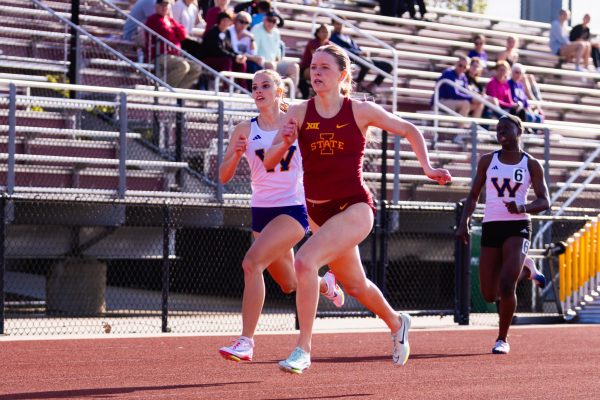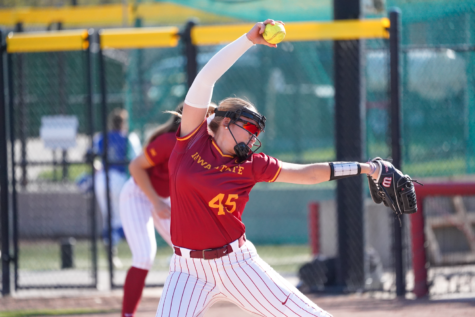COLUMN: Death on the field: The saddest, but often most inspiring stories in sports
July 1, 2003
A little over a year ago. My 19th birthday. Went home for the weekend. It’s a Saturday afternoon — time to relax and watch some baseball. Flipped the TV on to Fox. Cubs and Cardinals — no argument, it’s the greatest rivalry in sports.
The game isn’t on.
Angrily, I wondered why this great matchup wouldn’t be televised in Des Moines. It wouldn’t be the first time a dumb decision had been made about what people wanted to watch.
I knew it couldn’t be a rainout. Almost any weather system that affects Chicago has to go through central Iowa first, and the weather had been wonderful of late.
Eventually, Cubs catcher Joe Girardi showed up on the screen. The Cubs team, the umpires and Cardinals manager Tony La Russa were scattered behind him.
And the story came out. Cardinals pitcher Darryl Kile had died in his sleep the night before.
“We regret to inform you because of a tragedy in the Cardinal family that the commissioner has canceled the game today. Thank you,” Girardi said haltingly, clearly near tears.
Death and sports aren’t supposed to go together (an obvious understatement). It happens.
Two Sundays ago, the first anniversary of Kile’s death, the Cardinals and all of baseball looked back at the All-Star hurler’s career, so the situation is still fresh in my mind. Kile, by all accounts, was a great man who gave everything he had to his family and to his career.
“The day I broke into the big leagues, he called me up and took me to breakfast. He didn’t know me from Adam, but he made me feel good and feel like a teammate. It was tough. It’s like losing a part of your family,” Houston closer Billy Wagner told the Associated Press just after Kile’s death.
Although Kile didn’t pass away on the field, you get the feeling from quotes like Wagner’s that he would have given his life for his teammates.
Lately, all too many players have died doing just that.
The latest happened in soccer Thursday, when Cameroon midfielder Marc-Vivien Foe collapsed 72 minutes into a victory over Colombia.
Foe died hours after earning his 65th and final cap, following many attempts at resuscitation.
Nobody really has anything meaningful to say after such an event, and it shows in the news stories about Foe’s death. Most players, coaches and officials offered simple platitudes about loss and sorrow. A few pointed out the rigor of the Confederations Cup schedule — three first round games in five days for the eight participating nations.
Foe, though, hadn’t played since logging 90 minutes against Turkey June 21. He sat out his team’s 0—0 match with the United States June 23.
Certainly, there are times when athletes’ deaths have a revealed a failing in sport — in the cases of Northwestern football player Rashidi Wheeler and Minnesota Vikings tackle Korey Stringer, critics rightly pointed out that practices shouldn’t ever endanger lives.
The nature of competition, though, sometimes leads to people giving “everything” in an attempt to be better than the other guy.
That is how Iowa State remembers its greatest football hero, Jack Trice.
Trice, despite tremendous pain and injuries to his left shoulder, never wanted to leave the Cyclones’ game against Minnesota Oct. 6, 1923. His body suffered irreparable damage over the course of the game, and Trice died two days later.
But Trice’s much publicized letter, written to himself the night before the Minnesota game, reveals why this can happen sometimes in sports, and why we hold these supremely dedicated players in such high esteem:
“My thought just before the first real college game of my life: The honor of my race, family and self is at sake. Everyone is expecting me to do big things. I will. My whole body and soul are to be thrown recklessly about the field. Every time the ball is snapped, I will be trying to do more than my part. Fight low, with your eyes open and toward the play. Watch out for crossbucks and reverse end runs. Be on your toes every minute if you expect to make good. Jack”.
Everybody then wanted Trice to miraculously recover from his injuries, just as everybody joined Cameroon in hoping for a happy ending to Foe’s story, and just like so many sports teams have looked back sadly at the loss of a teammate.
Yeah, death and sports aren’t supposed to go together. But it happens, and it’s refreshing to see that people care when it does.
















